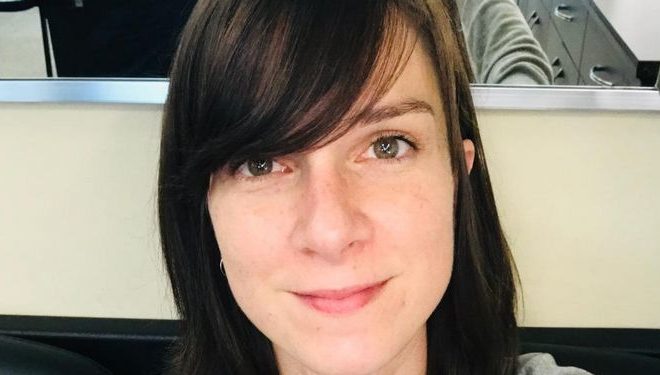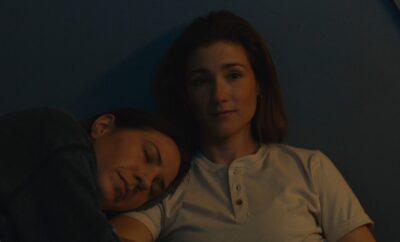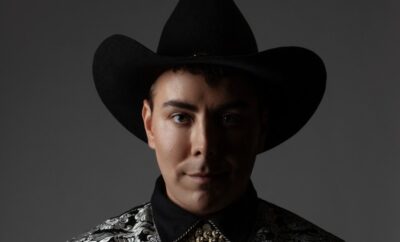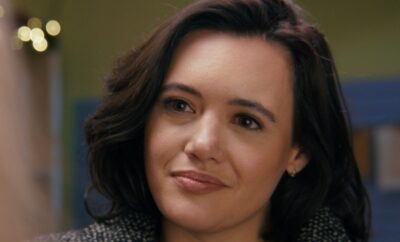
Interviews
Kathryn Trammell – Season of Love
By: Lisa Steinberg
Q) What I love about the film is it showcases various kinds of spectrum of couples in different stages of life, and it’s not just LGBT inclusive, it’s also provides deaf representation as well. When writing the film what were the important points, themes, and perspectives you wanted to touch upon with your work?
A) In short, I wanted to take certain themes and tropes we tend to see in queer films and flip those tropes and themes on their heads. For example, the theme of communication (or, rather, a breakdown of) is oftentimes negatively used in queer storylines to build walls between characters who struggle with communicating their queerness to family, friends, and love interests. In Season of Love I didn’t want communication to be a barrier – I wanted it to be a bridge, and while this is most evident in the Lou (Jessica Clark) and Kenna’s (Sandra Mae Frank) storyline, it applies to our other couples as well.
Q) What is it about the holidays that gives people the courage to try and mend fences that may have felt irreparable and reuniting with loves that may seem to be altogether lost?
A) I’m not sure if I can answer this without making a massive generalization.
Q) Love teaches us so many lessons, especially when we allow ourselves to be vulnerable. It’s often in our most vulnerable moments we are finally able to recognize the honesty and see the introspective within ourselves and can process feelings, emotions, or homesites about ourselves we may be hiding or harboring. Can you talk a little the journeys we see take place and the paths they lead us as viewers and the characters?
A) I think so many of us regard our vulnerabilities as a weakness, which is why we spend so much time creating defenses to keep ourselves from exposing them. It’s also why some of us become anxious when they are exposed. But being vulnerable isn’t a weakness. It’s a strength. And discovering this is a major part of Sue (Dominique Provost-Chalkley) and Janey’s journey. As we see them progress through stages of rekindling a relationship post-deployment, Sue allows herself to become more and more vulnerable with Janey. But when Janey betrays Sue’s trust by doing something, that ignites Sue’s anxiety. Sue has to fight through her perceived loss of control in order to emerge stronger than she was before. For Sue, it isn’t about overcoming anxiety. That’s impossible. Instead, it’s about finding the courage to accept that anxiety will always be a part of her, and that’s okay.
Q) You have partnered with Tello for the filming of the movie. They have an incredible track record with LGBT content and putting their all into both TV and film projects. What kind of direction, feedback, and guidance have they given you from your initial pitch until present pre filming?
A) Because Season of Love was the first feature film I’d ever written, my script read more like a novel in many ways than it did a screenplay. But what I found most rewarding about the revision process was the mentorship Christin [Baker] gave me when it came to helping me make that tonal shift from novel writing to script writing. She never once tried “fixing” the script for me because she knew I wouldn’t learn anything from it. Instead, she offered guidance so that I could fix the script myself. I can’t express how grateful I am for that kind of mentorship.
Q) Season of Love is a female led initiative, and with our current political climate and not many holiday-centric LGBT content, why is it even more important now for us to amplify female and community voices and push boundaries and landscapes further for inclusivity, positive representation, and diversity on screen?
A) There’s this psychological term called the “mere-exposure” or “familiarity principle” that asserts the more often people are exposed to something unusual, the more likeable and preferable they become to it – the more normalized something “different” becomes. I think part of the reason we’ve seen a rise in hate lately is largely due to people NOT being exposed to a wider spectrum of human beings. But even the most homogeneous populations have access to entertainment, which is why it’s important to create positive, inclusive stories across all forms of entertainment that have the potential to expose groups of people who look, think, and live the same way to people/characters who look, think, and live differently from them.
Q) The reaction and outpouring Season of Love had during the campaign was phenomenal, what has touched you the most about the embrace the film has already received?
A) Honestly, I was shocked at how many people connected with Sue having anxiety. When I wrote the character, her anxiety was so normal for me to write. I didn’t stop and think “this character has anxiety.” It wasn’t until Christin read the script and began asking about Sue’s anxiety that I realized what I’d done — I accidentally gave Sue some of my anxiety and that made me nervous. Then, when I saw how warmly people embraced Sue’s backstory, I wasn’t anxious about giving Sue anxiety anymore. The support of the backers was overwhelming in the best way possible.
Q) From the character breakdown descriptions, we get a plethora of diverse and multi-dimensional characters. How do these core characters help balance the poignant and provoking themes of the film all while engaging/connecting with the audience?
A) It’s been my intent from the beginning to portray positive queer relationships that, although not perfect, are healthy, strong and relatable. Essentially, the characters in Season of Love are afforded the same treatment straight romcom couples usually get and queer couples rarely get. That way, when someone connects with one of the characters in this film, it’s something positive they are relating to and not something negative, which is unfortunately usually the case with queer storylines. Don’t get me wrong – sad coming out stories, examples of discrimination, rejection of love, etc. have a place in the current queer entertainment zeitgeist. They just don’t have a place in this movie.
Q) The cast continued to grow and the names already attached are fantastic! Each person is going to bring something exceptional to their roles that we can’t wait to watch. What is it about each that you are most looking forward to seeing them embody?
A) Our cast is stellar. I’m still pinching myself over how lucky we’ve been to cast such incredible people in this film. While I can’t wait to see each of them play off each other in certain scenes, individually I think I’m most excited to see: Emily Goss embody Iris’s fall from self-imposed grace, Laur Allen embody Mardou’s strength in helping to pick Iris up again, Sandra Mae Frank embody Kenna’s constant poking at Lou’s personal bubble, Jessica Clark embody Lou’s response once that bubble is popped and Dominique Provost-Chalkley embody Sue’s process of letting Janey back into her life.
Q) Some of the hallmarks of romantic holiday movies include love, lessons, and levity. Since this is a holiday queer romcom, what kind of love and intimacy languages will we see expressed?
A) I can’t say too much about this without giving some of the plot away, but I can say that love is in abundance in this film because it’s what we need right now. And I truly hope that if you see this film and feel joy from watching each of these characters love in different ways, that joy will translate to love for yourself.
Q) Where do your personal connections to the characters come into play?
A) I have to bring it back to communication again. On a personal level, it’s been my experience that relationships built on a solid foundation of communication are among the strongest. This is why a breakdown of communication is perhaps the biggest catalyst for various conflicts in Season of Love. However, once healthy communication is established with each of the three couples in the film, the conflicts the characters face are largely resolved.
Q Is there anything you would like to say to the SOL backers for them to look out for or mention about their support?
A) I never expected the support, to be perfectly honest. I mean, sure, I got excited when I found out Tello wanted to produce my script, but I always had this thought in the back of my mind that the bottom would fall out eventually, so I never REALLY got my hopes up. But when I was at ClexaCon and we met our goal, then we met our first stretch goal, then another, it dawned on me that it was actually going to happen – a movie I wrote was going to be made – and it’s all because of backers. Our backers made this happen, and I will never stop being grateful for that.





You must be logged in to post a comment Login